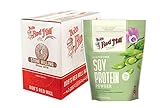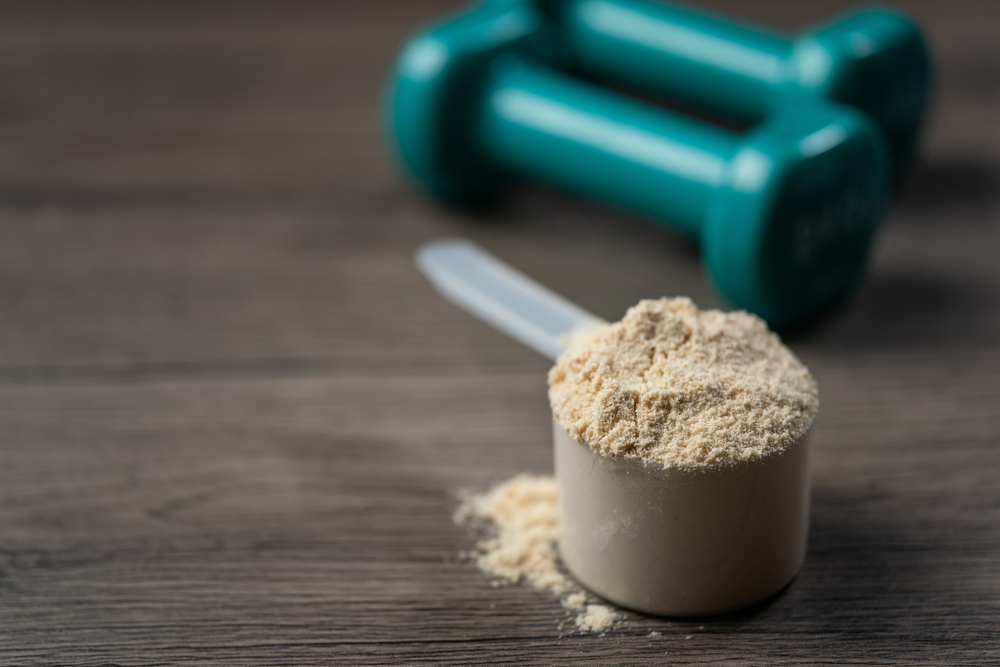Frequent gym goers and health enthusiast alike have likely had their run ins with whey, specifically in the form of whey protein containing products or powders. A common convenient protein additive for those looking to make gains in the gym, whey itself can seem mysterious to many. For those following a gluten-free diet, is whey approved?
Whey is gluten-free because it contains no grains. Other forms of whey, such as whey protein concentrate, isolate, and hydrolysate are also gluten-free. Naked Nutrition, Raw Organics and AGN Roots all offer gluten-free whey protein powders. Suitable gluten-free alternatives include Bob’s Red Mill Soy Protein Powder, Naked Nutrition Pea Protein Powder and Sprout Living Pumpkin Seed Protein Powder [1].
Now that we know whey itself is gluten-free, let’s take a deeper look into what whey is, its health benefits and drawbacks and some of the top-rated gluten-free alternatives on the market.
Contents
What is Whey?
Whey is a quick digesting protein source from cow’s milk that is often removed and added to products such as shakes, powders and bars. Whey is one of the two proteins found in milk. The other protein is casein, which is often used in making cheese or yogurt and composes the majority of the protein in cow’s milk, about 80%. Casein is slower digesting than whey.
During cheese making, whey is composed of the remaining liquid after milk has been curdled, and the curds have been removed. Whey and whey protein are the same thing. However, it is often processed into a powder to be easily added into products or drinks [2].
Different types of Whey Protein Powders
If you are looking into taking a whey protein supplement, you will quickly find there are many different types. The main difference between them lies with their processing. The 3 main forms of whey protein you will find on the market are whey protein concentrate, whey protein isolate, and whey protein hydrolysate.
1. Whey Protein Concentrate
Whey protein concentrate is one of the most common forms of whey protein found in supplements. It is also the most inexpensive. Following processing, whey protein concentrate is up to 80% protein with the remaining 20% a mixture of fat and carbohydrates.
2. Whey Protein Isolate
Whey protein isolate is the second most common form of whey protein found in supplements. The main difference between whey protein isolates and concentrate is that whey protein isolate contains more protein. This type of whey contains at least 90% or more protein and 10% or less carbohydrates and fat. It is also processed to remove or reduce the lactose content making it friendly for those with lactose intolerance.
3. Whey Protein Hydrolysate
Whey protein hydrolysate is whey protein that has been broken down even further to increase ease of digestion and rate. This also tends to be the most expensive form of whey protein. This process breaks down the whey into its essential amino acids. However, when compared between the other types of whey protein, the difference is not that significant.
Health Benefits of Whey
Whey is best known for being a quickly digested, complete protein source. Because of this, whey protein has been studied for its impact on muscle mass during strength training. Whether an athlete is looking to build muscle, or an older individual is working to keep their health and prevent muscle loss, whey protein can be a helpful addition. Although, if one is already consuming enough high-quality protein in their diet, adding in a whey supplement may not make a significant difference.
Whey can also be beneficial for those looking to lose weight. Protein is considered one of the most filling macronutrients and whey protein specifically appears to be more satiating than other forms of protein. This can allow for less calories to be consumed throughout the day. It can also help to boost metabolism and maintain muscle mass while losing weight. [4, 5, 6, 7].
Health Drawbacks of Whey
High protein diets and excessive protein intake by way of supplementation, such as whey protein, have increased in popularity. Because of the believe of protein’s performance enhancing abilities, many are over-doing it and there is such thing as too much of a good thing. Too much protein cannot be utilized by the body and can be hard on our organs, such as our liver and kidney [8].
The current recommended daily allowance of protein is 0.8 grams per kilogram body weight, unless otherwise recommended by your doctor. For athletes and pregnant women, this can be increased up 1.1 grams per kilogram body weight [9].
In its natural form, whey is hard to over-consume. However, now that is has been processed and incorporated into powders and products it has become a lot easier to get more protein in one sitting. Always be sure to take whey protein supplements as directed. Too much protein at one time can result in digestive discomfort.
Nutrition Facts for Whey (Unprocessed)
Nutrition Facts (Per 1 cup): [3]
- Calories 66
- Fat 1g
- Saturated fat 0.5g
- Sodium 130mg
- Carbohydrates 13g
- Sugar 13g
- Added sugar 0g
- Fiber 0g
- Protein 2g
Best Gluten Free Whey Protein Products
Below are some of the top rated, gluten-free whey protein powders currently on the market.
Naked Nutrition Naked Whey
Naked Nutrition’s grass-fed naked whey protein powder is free of additives and artificial sweeteners. Their products are manufactured in a Good Manufacturing Practices (GMP) facility to ensure the quality of their supplements. You can find this product online at Nakednutrition.com priced at $89.99 for a 5-pound container.
Ingredients:
- Whey protein concentrate
Nutrition Facts (Per 2 scoops (30g)):
- Calories 120
- Fat 2g
- Saturated fat 0.5g
- Sodium 45mg
- Carbohydrates 3g
- Sugar 2g
- Added sugar 0g
- Fiber 0g
- Protein 25g
Raw Organic Whey
USDA certified organic, gluten-free, grass-fed on sustainable farms, Raw organic whey is processed at a lower temperature to preserve the antioxidants in their product. You can find Raw organic whey powder online at various retail sites, including Amazon.com and Walmart.com, priced at $39.20 for a 12-ounce bag.
Ingredients:
- Organic whey protein concentrate
Nutrition Facts (Per 5-tablespoons):
- Calories 97.5
- Fat 1g
- Saturated fat 0g
- Sodium 40mg
- Carbohydrates 2g
- Sugar 2g
- Added sugar 0g
- Fiber 0g
- Protein 21g
AGN Roots Grass-Fed Whey
AGN Roots grass-fed whey protein powder is sustainably sourced, free of added hormones, non-GMO, cold-pressed, and microfiltered. You can find this product online at AGNroots.com priced at $56.00 for a 3-pound bag.
Ingredients:
- Grass-fed whey protein isolate
- Non-GMO sunflower lecithin
Nutrition Facts (Per 2 scoops (29g)):
- Calories 110
- Fat 0g
- Saturated fat 0g
- Sodium 65mg
- Carbohydrates 1g
- Sugar 0g
- Added sugar 0g
- Fiber 0g
- Protein 25g
Gluten-Free Alternatives to Whey
For those who are looking to avoid animal products, below are a few top-rated gluten-free alternatives to whey protein.
Bob’s Red Mill Gluten-Free Soy Protein Powder
 Soy protein is a great plant-based, naturally gluten-free protein powder that can be used in place of whey protein. Bob’s Red Mill gluten-free soy protein powder is highly digestible, nutrient-dense and contains no added flavors, colors, or sweeteners. You can find this product online at bobredmill.com or Amazon.com priced at $11.73 for a 14-ounce bag.
Soy protein is a great plant-based, naturally gluten-free protein powder that can be used in place of whey protein. Bob’s Red Mill gluten-free soy protein powder is highly digestible, nutrient-dense and contains no added flavors, colors, or sweeteners. You can find this product online at bobredmill.com or Amazon.com priced at $11.73 for a 14-ounce bag.
Ingredients:
- Isolated soy protein
- Soy lecithin
Nutrition Facts (Per ¼ cup):
- Calories 80
- Fat 1g
- Saturated fat 0g
- Sodium 190mg
- Carbohydrates 1g
- Sugar 0g
- Added sugar 0g
- Fiber 0g
- Protein 17g
Naked Nutrition Naked Pea
 Naked Nutrition’s Naked pea protein powder is another suitable, gluten-free alternative to whey protein. Pea protein is easily digestible, made from yellow split peas. Naked Nutrition’s pea protein contains no additives or artificial sweeteners and is third party tested. You can purchase this product online at Nakednutrition.com priced at $54.99 for a 5-pound container.
Naked Nutrition’s Naked pea protein powder is another suitable, gluten-free alternative to whey protein. Pea protein is easily digestible, made from yellow split peas. Naked Nutrition’s pea protein contains no additives or artificial sweeteners and is third party tested. You can purchase this product online at Nakednutrition.com priced at $54.99 for a 5-pound container.
Ingredients:
- Yellow pea protein
Nutrition Facts (Per 2-scoops (30g)):
- Calories 120
- Fat 0.5g
- Saturated fat 0g
- Sodium 110mg
- Carbohydrates 2g
- Sugar 2g
- Added sugar 0g
- Fiber 0g
- Protein 27g
Sprout Living Simply Pumpkin Seed Protein
 A less well-known plant-based protein powder is pumpkin seed protein. With 20 grams of complete protein, Sprout Living Simply Pumpkin Seed protein is USDA certified organic, gluten-free, non-GMO and cold-pressed. This plant protein is easily digestible like whey protein and offers a slightly nutty flavor without any additives. You can find this product online at Sproutliving.com priced at $29.95 for a 1-pound bag.
A less well-known plant-based protein powder is pumpkin seed protein. With 20 grams of complete protein, Sprout Living Simply Pumpkin Seed protein is USDA certified organic, gluten-free, non-GMO and cold-pressed. This plant protein is easily digestible like whey protein and offers a slightly nutty flavor without any additives. You can find this product online at Sproutliving.com priced at $29.95 for a 1-pound bag.
Ingredients:
- Cold-pressed pumpkin seed powder
Nutrition Facts (Per 2-scoops (30g)):
- Calories 102
- Fat 3g
- Saturated fat 0g
- Sodium 2mg
- Carbohydrates 4g
- Sugar 0g
- Added sugar 0g
- Fiber 3g
- Protein 20g
Related Questions
Is Whey Protein Concentrate Gluten Free?
Whey protein concentrate and whey protein isolate are naturally gluten-free. However, some whey protein powders may have added gluten or come in contact with gluten during processing. They may also be combined with gluten-containing ingredients if in the form of a shake or other product.
Is Whey protein Dairy Free?
Whey protein is derived from dairy, therefore whey protein and other derivatives, such as whey protein concentrate, isolate and hydrolysate, are not considered dairy-free. Whey protein Isolate does contain less lactose for those who have an intolerance.
Does Whey Protein Cause Acne?
Studies have shown those who over-consume protein on a chronic basis may experience acne. If you are taking whey protein supplements and you start to notice you are breaking out, you may consider lowering your protein intake.
